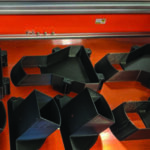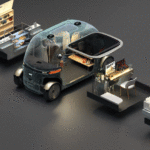The German Federal Ministry of Education and Research’s IDAM (Industrialization and Digitization of Additive Manufacturing for Automotive Series Processes) project recently held its first meeting in Munich. The project aims to expand automated 3D printing processes throughout the German automotive production industry for the purpose of reducing manual labor requirements as well as the design and manufacturing costs of metal components.
Experts Assemble!
With BMW coordinating the project, a dozen industry leaders and research institutes have joined the partnership, including the Chair for Digital Additive Production (DAP), the Fraunhofer Institute for Laser Technology ILT, Intec, Volkmann, and the Technical University of Munich. Modular, automated 3D printing production lines are being installed at BMW Group’s Additive Manufacturing Center and at automotive supplier GKN Powder Metallurgy’s factory.
The AM production lines are expected to greatly reduce the amount of manual labor and the costs required to fabricate metal parts as Fraunhofer ILT explained in a press release: “By taking an integrated view of the automotive production line into account, the project partners plan on reducing the manual share of activities along the process chain from currently around 35 percent to less than 5 percent. In addition, the unit costs of 3D printed metal components should be more than halved.”
Scaling Cost Savings with AM
IDAM should lead to the 3D printing of at least 50,000 mass-produced automotive parts and 10,000 spare parts per year, which will generate massive cost savings while providing more customized solutions. The importance of having many automotive and AM experts partnered with the project cannot be understated; the IDAM team will ensure that all processes and materials meet industry performance and safety standards.
Fraunhofer ILT stated, “Since large industrial companies are involved, these linked modules can be used in the AM production lines under real conditions and on a large scale. In addition, industrial standards can be set, and industry-relevant quality characteristics elaborated. Only through this interdisciplinary cooperation does the IDAM project make it possible to holistically examine metal 3D printing for automotive series processes and to establish it sustainably in production.”










